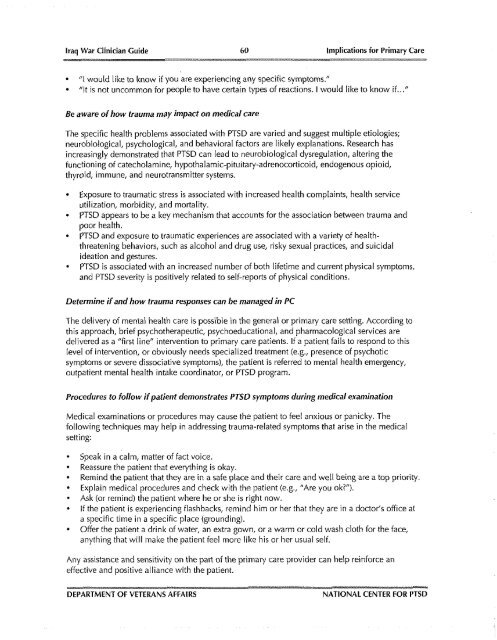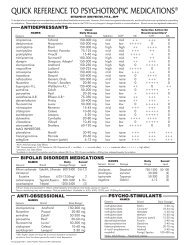IRAQ WAR CLINICIAN GUIDE
Iraq War Clinician's Guide - Network Of Care
Iraq War Clinician's Guide - Network Of Care
Create successful ePaper yourself
Turn your PDF publications into a flip-book with our unique Google optimized e-Paper software.
Iraq War Clinician Guide 60 Implicationsfor Primary Care<br />
P<br />
"Iwould like to know if you are experiencing any specific symptoms."<br />
'It is not uncommon for people to have certain types of reactions. I would like to know if..."<br />
Be aware of how trauma may impact on medical care<br />
-- -<br />
The specific health oroblems associated with PTSD are varied and suggest multiple etiologies;<br />
neurdbio~o~ical, ps;chological, and behavioral factors are likely explanations. desearch has<br />
increasingly -, demonstrated that PTSD can lead to neurobiological - dysregulation, . - altering - the<br />
functioning of catecholamine, hypothalamic-pituitary-adrenocorticoid, endogenous opioid,<br />
thyroid, immune, and neurotransmitter systems.<br />
Exposure to traumatic stress is associated with increased health complaints, health service<br />
utilization, morbidity, and mortality.<br />
PTSD appears to be a key mechanism that accounts for the association between trauma and<br />
poor health.<br />
PTSD and exposure to traumatic experiences are associated with a variety of healththreatening<br />
behaviors, such as alcohol and drug use, risky sexual practices, and suicidal<br />
ideation and gestures.<br />
PTSD is associated with an increased number of both lifetime and current physical symptoms,<br />
and PTSD severity is positively related to self-reports of physical conditions.<br />
Determine if and how trauma responses can be managed in PC<br />
The delivery of mental health care is possible in the general or primary care setting. According to<br />
this approach, brief psychotherapeutic, psychoeducational, and pharmacological services are<br />
delivered as a "first line" intervention to primary care patients. If a patient fails to respond to this<br />
level of intervention, or obviously needs specialized treatment (e.g., presence of psychotic<br />
symptoms or severe dissociative symptoms), the patient is referred to mental health emergency,<br />
outpatient mental health intake coordinator, or PTSD program.<br />
Procedures to follow if patient demonstrates PTSD symptoms during medical examination<br />
Medical examinations or procedures may cause the patient to feel anxious or panicky. The<br />
following techniques may help in addressing trauma-related symptoms that arise in the medical<br />
setting:<br />
Speak in a calm, matter of fact voice.<br />
Reassure the patient that everything is okay.<br />
Remind the patient that they are in a safe place and their care and well being are a top priority<br />
Explain medical procedures and check with the patient (e.g., "Are you ok?").<br />
Ask (or remind) the patient where he or she is right now.<br />
If the patient is experiencing flashbacks, remind him or her that they are in a doctor's office at<br />
a specific time in a specific place (grounding).<br />
Offer the patient a drink of water, an extra gown, or a warm or cold wash cloth for the face,<br />
anything that will make the patient feel more like his or her usual self.<br />
Any assistance and sensitivity on the part of the primary care provider can help reinforce an<br />
effective and positive alliance with the patient.<br />
DEPARTMENTOF VETERANS AFFAIRS<br />
NATIONALCENTER FOR PTSD




